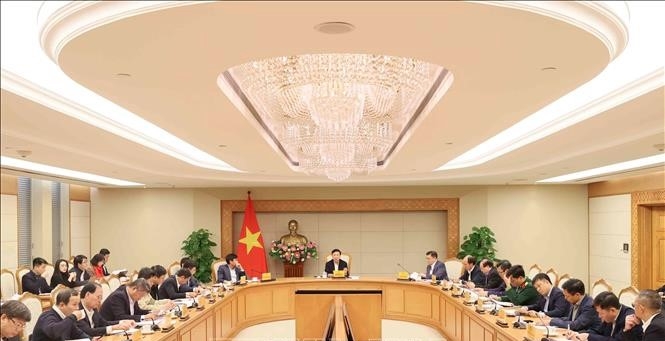Russia, Vietnam boost economic-trade and scientific-technological co-operation
VOV.VN - Deputy Prime Minister Tran Hong Ha chaired a meeting of the Vietnam Subcommittee of the Vietnam-Russia Intergovernmental Committee on economic-trade and scientific-technical co-operation on December 12 in Hanoi.

At the meeting, leaders of ministries and sectors reported on the implementation of a master plan specifically aimed at co-operation development between the two countries until 2030, as well as some bilateral co-operation contents since the 25th session held back in September.
They also pointed out difficulties and obstacles faced in terms of reviewing, agreeing on, and implementing roadmaps and collaboration projects on industry, agriculture, trade, healthcare, tourism, labour, and education, expanding co-operation in the oil and gas sector and traditional energy sectors, and a project to build the Russian High School and Moscow House in Hanoi.
Deputy PM requested ministries and sectors go ahead with closer collaboration efforts with each other and Russian partners to effectively carry out co-operation agreements agreed upon at the 25th session, with a strong determination to remove difficulties and obstacles arising in the implementation of joint programmes and projects. This is along with enhancing the role of the Intergovernmental Committee in promoting linkages between the two countries in general, as well as in the fields of economics, trade, and science and technology in particular.
According to the Minutes of the 25th session of the Vietnam - Russia Intergovernmental Committee on Economic-Trade and Scientific-Technological Cooperation, the two sides agreed on over 100 items in more than 20 areas of co-operation and showed their determination to boost ties across multiple fields ranging from politics-diplomacy, economics-trade-investment, agriculture, industry, energy - oil and gas, information - communications, science - education, culture – sports, tourism, and people-to-people exchanges.
Most notably, the two sides continued to affirm and strive to strengthen political trust, intensify the exchange of high-level delegations and all levels, increase import and export turnover, achieve balanced and sustainable bilateral trade, and create conditions for agricultural products and pharmaceuticals to access each other's markets.
Both sides also agreed to increase the teaching of Vietnamese and Russian in the two countries, maintain scholarships for Vietnamese students, as well as working to attract Russian students to study and research in the nation. This is along with creating favourable conditions for granting visas for Vietnamese citizens to work and travel in Russia.
The Russian side acknowledged the Vietnamese request to create more favourable conditions for the Vietnamese community based in Russia.


